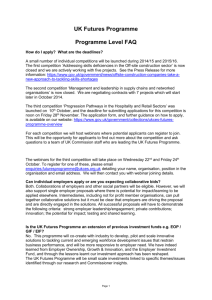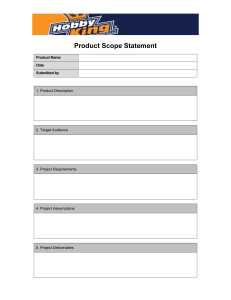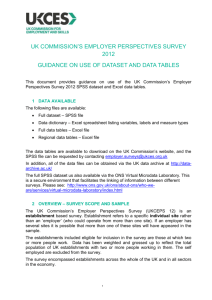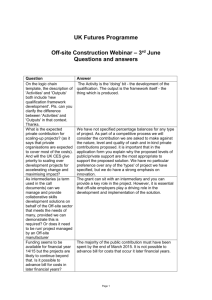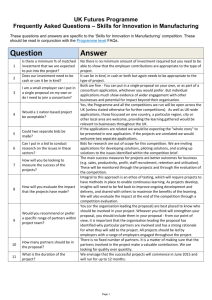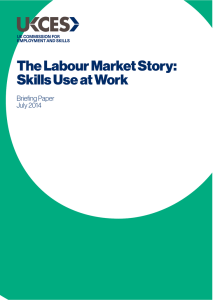information for potential UKCES research suppliers
advertisement
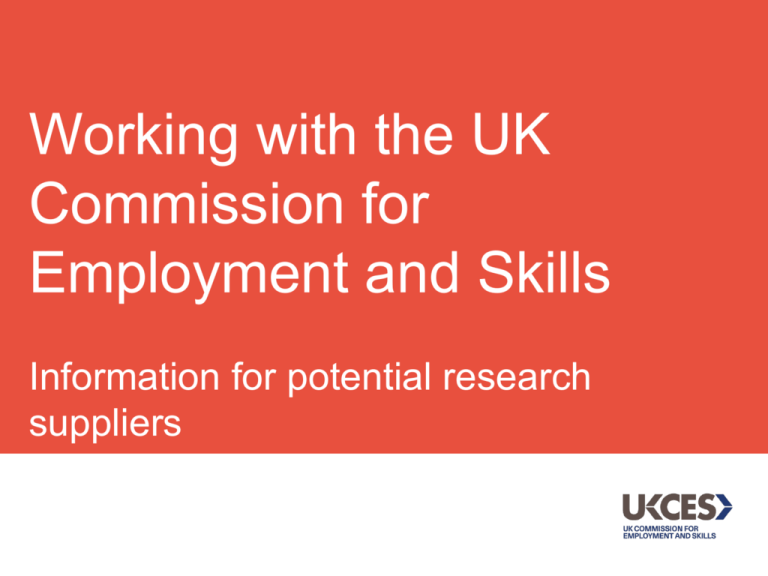
Working with the UK Commission for Employment and Skills Information for potential research suppliers July 2014 What will you find out? This presentation provides information on: • • • • What the Commission does How we work Our objectives and deliverables for 2014-15 What types of support you can provide • What you need to do • How you can best demonstrate your expertise when bidding More detailed information is provided in the notes pages 2 About the UK Commission: our remit and our ambition About the UK Commission for Employment and Skills (UKCES) UKCES works with industry and government to help achieve better outcomes in how people get in and on in work and how businesses succeed through the skills and talents of their people. Our priorities for 2014 to 2015 are to: • create more opportunities for all young people to get in and on in work • improve the skills, productivity and progression of those in work • build stronger vocational pathways into higher level skills and jobs. Our Commissioners 5 Research at the UK Commission Our research Core principles • • Our research is high quality, objective and robust • We are outward focused: our research is action-orientated and informs our activities We are Commissioner-led and draw on leading-edge insights • We are interested in policy innovation based on evaluative assessments of ‘what works’, including internationally • We are apolitical and our work considers the long term as well as immediate issues 8 How we work • We use in-house expertise (members of the research and technical team) to design, manager and deliver programmes of work • We commission a wide range of external suppliers to deliver specific projects, ranging from fieldwork for the UK Commission’s Employer Skills Survey of over 80,000 employers to small-scale literature reviews • • We use a pool of Associates for targeted pieces of work We work with strategic partners (such as the OECD and ESRC) to gain policy insights. 9 Our objectives For 2014-17 we have four objectives: 1. Lead the debate with industry to drive better outcomes for skills, jobs and growth 2. Work with industrial partnerships and wider networks to push forward employer ownership of skills 3. Test out employer-led innovation to address persistent skills challenges 4. Help businesses realise the potential of their people through Investors in People Our research work supports objectives 1-3. Each objective is underpinned by detailed deliverables. Objective 1 - deliverables Lead the debate with industry to drive better outcomes for skills, jobs and growth. • 1.1 In key policy areas of youth employment, progression in work and pathways to higher level skills, Commissioners will promote inspiring insights from our networks and research • 1.2 Produce and promote robust business intelligence to ensure that skills development supports choice, competitiveness and growth for local and industrial strategies 11 Objective 1 - research In this area we will be commissioning: • • Analysis to inform a skills audit (July/August 2014) Analysis to support Commissioner Inquiries (timing and specification will depend upon the nature of the inquiry and reporting dates) • The UK Commission’s Employer Skills Survey 2015 (October 2014) • Supporting partnership activity (e.g. events with Local Enterprise Partnerships and FE Colleges to promote use of UKCES data, timing tbc) • Procuring Research Associates to support a range of research activity (July 2014) 12 Objective 2 - deliverables Work with industrial partnerships and wider networks to push forward employer ownership of skills • 2.1 Establish and coordinate an industry led occupational standards programme that underpins Apprenticeships and vocational qualifications across the UK • 2.2. Work with industrial partnerships and networks to galvanise action on skills in line with national industrial strategies • 2.3 Manage the performance and evaluate our existing employer investment programmes projects 13 Objective 2 - research In this area we will be commissioning: • Sector insight work, including research to inform the development of occupational standards. This could include labour market intelligence projects focusing on specific sector skill needs and occupational pathways in priority sectors (August 2014) • Formative evaluation and impact measures for new National Occupational Standards (Autumn 2014) We do not currently anticipate procuring additional work to support the evaluation of the EIF and GIF programmes 14 Objective 3 - deliverables Test out employer-led innovation to address persistent skills challenges • 3.1 Establish and pilot a UK Futures Programme which supports projects against skills challenge rounds Existing competitions include off site construction; and leadership and management in supply chains. 15 Objective 3 - research • In this area ‘research’ may be a type of project we are looking to invest in (see guidance documents here) within our thematic competitions • Evaluation – we are undertaking a largely ‘developmental evaluation’ approach to the evaluation of Futures Programme and will be seeking Facilitators for Innovation Labs plus commissioning an evaluation of the Futures Programme as a whole (July 2014). 16 Working with us 17 What can you provide? • We use external experts to: • Provide additional support to the team • Provide external expertise • Provide challenge to our thinking • Short-term support on smaller pieces of work • High level, intellectually rigorous challenge and support • Links to latest research and emerging methodological approaches 18 What are we looking for? • • Technical expertise including data analysis and modelling • In-depth understanding of particular sectors or types of skills intervention Understanding and experience of skills policy and how it relates to the wider economy • Ability to draw together evidence and present results to a range of audiences • Understanding of policy context and ways in which to shape it 19 How can you best demonstrate your expertise? • Clear, succinct bids welcomed • Think about our wider remit and how this project supports our work • Consider collaborative bids where each party brings specific and demonstrable expertise • Think about the audiences for the work and how you can support dissemination • Bids need to demonstrate value for money - value for money does not necessarily mean the cheapest bid 20 Tips for bidders • Project methodology should be clearly linked to the aims and objectives set out in the ITT • Many bids fail because contractors have not read the ITT closely and considered weighting of the criteria • Previous experience of working together cannot be taken into account • All evidence to be taken into account must be explicitly stated in the tender document 21 01709 774 800 info@ukces.org.uk https://twitter.com/ukces 22
